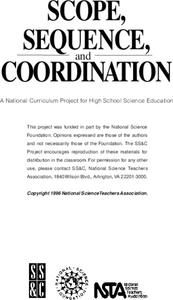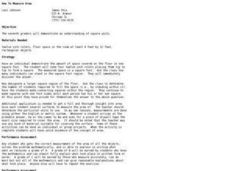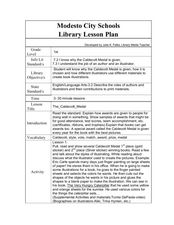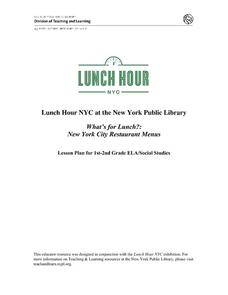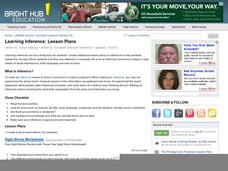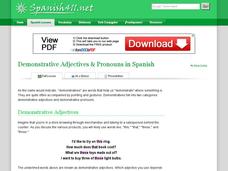California Academy of Science
Notice and Wonder
Pint-sized zoologists practice the art of observation. They take notes, pictures or written, as they observe an animal for a period of time. This can be done at the zoo, with a visiting classroom animal, or perhaps at the humane society....
Curated OER
Colors Clip Art
Explore the ways in which block color clip art can enhance your classroom. These bright printable color blocks come with five different teaching ideas that span graphing, sorting, and even bulletin board building.
K12 Reader
Add a Prepositional Phrase to an Adjective Phrase
Don't just rely on adjectives to describe the nouns in your sentence! Use a handy worksheet to review prepositional and adjective phrases. Learners read eight sentences and add prepositional phrases as adjectives after either the subject...
Curated OER
Classification Schemes
Junior biologists journey through the hiearchy of living things with these activites. Using a dichotomous key, they identify common algae, plants, and fish. They design their own key for a mixture of seeds and a collection of...
Curated OER
Number Search in Monterey Bay Aquarium
Youngsters search for an animal with body parts for each number from one to ten during a field trip to an aquarium. They count rays, fins, feet, gills, eyes, spots or anything. When they get back to the classroom, they compile their...
Curated OER
Advanced Art – Cultural Place-setting Still life
Upper graders view a series of films that depict rituals or celebrations as they occur in different cultural settings. They conduct a cultural investigation about one culture, brainstorm and research objects that have cultural or...
Curated OER
Layer Cake Archaeology
Excavating cake? Why not! Kids spoon into some layers and artifacts during this tasty hands-on activity. The cake, a simulated archaeological dig, is the object of observation and discussion.
Curated OER
I Know An Old Lady
Have your young pupils complete a variety of activities related to the story "I Know an Old Lady." They act-out the story using puppets, visit the illustrator's website, discuss his cartoon drawings for the book, and generate a list of...
Curated OER
How To Measure Area
Geometers learn how to measure the area in square units. They use the floor in the classroom as a visual to measure a square foot area. They use classmates to fill the space and expand the measured area square foot by square foot until...
Curated OER
Authors and Illustrators: What do they do?
Help readers understand the roles of authors and illustrators and why they have been recognized by medals of excellence. Your class will discuss and then create illustrations for a book. When they have finished, you can hold your own...
Curated OER
Marvelous Magnets
Learners investigate the properties of magnets. In this physics lesson, students view a Powerpoint presentation on magnets and list facts about magnets they learned. Learners use magnets in the classroom to identify what materials they...
Curated OER
"Snapshot" Exercises & Sensory Detail Word Bank
Read a sample of creative descriptive writing to your science class. Discuss how writing can be used to record and communicate observations that scientists make. Reading selections and thought-provoking questions are suggested. Also...
Curated OER
Los sustantivos
Your beginning Spanish speakers will learn basic classroom vocabulary with this quick PowerPoint. It introduces the key vocabulary terms, their corresponding gender, and the article for each. The last five slides provide a brief...
K12 Reader
What Is a Simile?
As fun as a barrel of monkeys, this figurative language worksheet will engage your students in learning to write similes. Asking them to first think of adjectives describing the six nouns listed on the page, this exercise has young...
New York Public Library
What's for Lunch?: New York City Restaurant Menus
Do you remember the days when a cup of coffee cost five cents? At A.W. Dennett restaurant in 1894, you could buy a five-cent cup of coffee and as well as a five-cent slice of pie to accompany it. The menu from that year is a primary...
Curated OER
Learning Inference
Making inferences can be a tricky proposition for middle schoolers. In the lesson presented here, pupils practice the skill of drawing a conclusion and making a judgment - which are what making an inference is all about! There are five...
Hawaiʻi State Department of Education
Mask Symmetry
When you engage learners in creating symmetrical objects you are also building their vocabulary and math sense. Kids discuss key words such as, asymmetrical, symmetrical, balance, tint, and shade. They use these elements of design to...
Baylor College
Need or Want?
Even as adults it can be hard to distinguish needs from wants. Using pictures of common, everyday items, children make a pocket chart separating the objects they need from those that they want. Discuss their choices, explaining that...
Curated OER
Demonstrative Adjectives & Pronouns in Spanish
Encourage mastery of demonstrative adjectives and demonstrative pronouns. Try out the presentation to introduce your class to the concepts and practice with two integrated exercises. The At a Glance tab and Full Lesson tab can be used...
Exploratorium
Falling Feather
Whether or not Galileo actually dropped balls from the Leaning Tower of Pisa, this demonstration will solidly demonstrate that objects are accelerated at the same rate, regardless of mass. You will, however, need a vacuum pump and a few...
IRISS
Exploring Self-Esteem 1: What Is Self-Esteem?
Adolescents explore self-esteem and the various factors that influence a person's sense of self in this four-part lesson series. Through a combination of whole class instruction, small group discussions, and independent work, students...
Virginia Commonwealth University
General Construction Measurement and Dimensions
Learners construct their understanding of measurement and dimensions in this step-by-step approach that begins with an all group vocabulary introduction, consisting of measuring objects and dialoging using measurement vocabulary....
Dick Blick Art Materials
“Gawu” — African-influenced Tapestry
Here's a great way to combine environmental science with art. Kids use recycled materials to create their own Gawu, a tapestry made of discards. Although designed for special education classrooms, the activity is sure to engage all...
Dick Blick Art Materials
Painted Lockets
Painted, portable, pocket lockets encourage kids to display personal treasures and items they value. The activity, combining art with social and character studies, is perfect for any classroom.
Other popular searches
- Classroom Objects Bingo
- Classroom Objects Coloring
- French Classroom Objects
- Classroom Objects in Spanish
- Spanish Classroom Objects
- Esl Classroom Objects
- Classroom Objects Vocabulary
- Naming Classroom Objects
- Objects in a Classroom
- Classroom Objects in French
- Classroom Objects Bingo Food
- Classroom Objects Lessons





